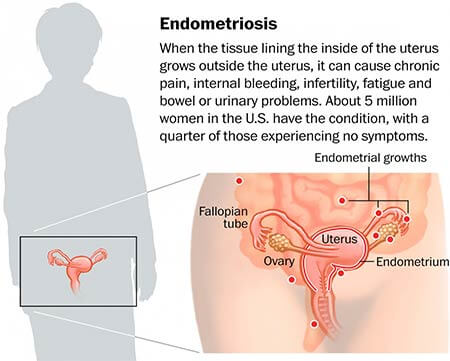What is Endometriosis?
 Endometriosis is a painful, chronic disease that affects woman during their reproductive period.
Endometriosis is a painful, chronic disease that affects woman during their reproductive period.
Endometriosis never shows up before puberty and usually ends with menopause. It is characterized by the implantation of the endometrial tissue outside of the endometrium.
- internal endometriosis – If the tissue gets implanted inside the myometrium, it is called internal endometriosis.
- external endometriosis – If the tissue gets implanted outside of the uterus (ovaries, cervix, vagina, bladder, rectum, peritoneum, etc.), it is called external endometriosis.
Endometrial tissue
This endometrial tissue which is located outside of its normal place, responds to the menstrual cycle in the same way as the endometrial tissue located inside the uterus. Every month the endometrial tissue builds up, breaks down, and sheds.
Internal bleeding
Normally, when this process occurs inside the uterus, the blood gets out of the human body through the vagina. But, in cases when the endometrial tissue is located outside of the uterus, there is no way for the blood to get out. This internal bleeding leads to the signs and symptoms of endometriosis, depending on the place where the endometrial tissue has penetrated.
The real cause of endometriosis is not known. However, there are different theories that try to explain it. Some women are at a greater risk than others. Endometriosis is more common in women who have never give birth, have periods longer than 7 days, have cycles shorter than 28 days, had their first period before the age of 12, have someone in the family with endometriosis, etc.
Signs and Symptoms of Endometriosis
The signs and symptoms of endometriosis vary from one woman to another. The amount of endometriosis does not always correspond to the amount of pain and discomfort a woman can feel. Usually, the symptoms vary from the menstrual cycle, and with time, they intend to get worse.
Classic signs and symptoms of endometriosis are:
- Irregular, heavy, and painful periods
- Painful sexual intercourse
- Pain after sexual intercourse
- Painful bowel movements
- Fatigue
- Infertility, etc.
However, not only the above signs and symptoms are present. A lot of woman with endometriosis also experience pain while urinating, diarrhea altered with constipation, bloating, especially during the periods, tiredness, lack of energy, leg pain, back pain, epistaxis, etc.
Endometriosis can affect all the organs in the human body.
Endometriosis affecting the bladder is rare, and signs and symptoms vary from the penetration of endometriosis. The penetration can be deep or superficial. Superficial endometriosis is found on the outer surface of the bladder, while deeper endometriosis is found on the inside of the bladder wall.
Deeper Endometriosis
In some cases, deeper endometriosis can also cause a nodule, which can also affect the ureter.
When the bladder is affected, the following signs and symptoms are possible:
- Bladder irritation
- Frequent need to urinate
- Blood in the urine during periods
- Pain when the bladder is full
- Pain in the kidney area
Endometriosis on the Surface of the Bowel
Endometriosis also affects the bowel. In cases when the penetration is superficial, endometriosis can be found on the surface of the bowel, while in cases when the penetration is deeper, endometriosis can be found inside the bowel wall. Nodules are also possible in the recto-vaginal area.
Signs and symptoms of endometriosis which affects the bowel include:
- Deep pelvic pain during sexual intercourse
- Rectal bleeding during periods
- Painful bowel movements
- Pain on opening the bowls, etc.
The biggest problem of endometriosis is infertility. The infertility rate among woman with endometriosis is higher compared to woman without endometriosis. The rate is up to 40%. Medical treatments can help a lot of woman overcome infertility, and pregnancy itself, in some cases, can relieve the signs and symptoms of endometriosis.
Do you have questions about Endometriosis Signs and Symptoms? Would like to schedule an appointment with the top Endometriosis specialist, please contact our Brooklyn Heights office.
Dr. Amir Marashi, MD
Brooklyn GYN Place
142 Joralemon Street, Suite 4CF
Brooklyn, NY 11201
(Brooklyn Heights)
718-624-0604
Disclaimer:
The information provided on this site is intended to educate the reader about certain medical conditions and certain possible treatment. It is not a substitute for examination, diagnosis, and medical care provided by a licensed and qualified health care professional. If you believe you, or someone you know suffers from the conditions described herein, please see your health care provider immediately. Do not attempt to treat yourself or anyone else without proper medical supervision.- Our office has a 24/7 answering service to address any emergencies.
